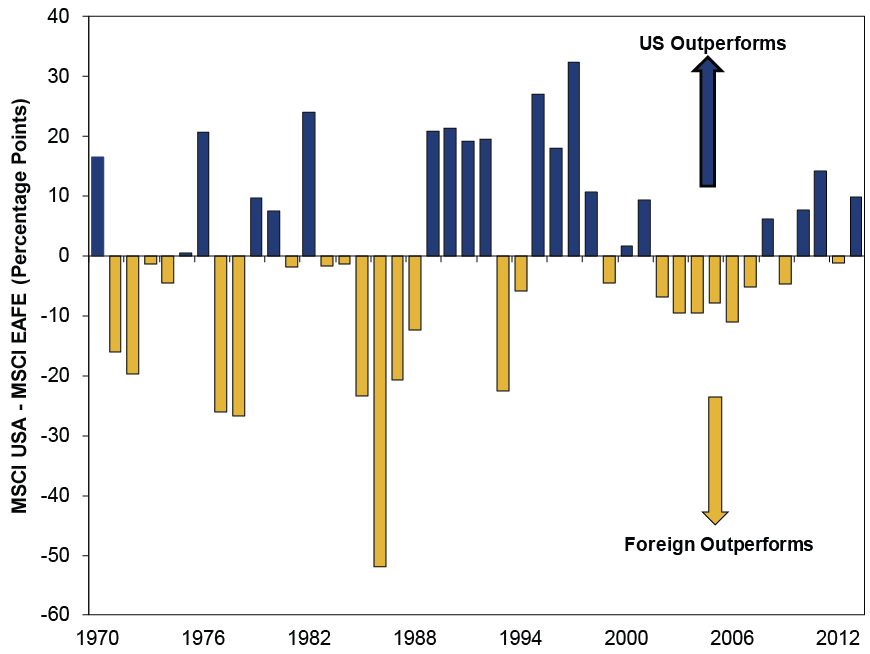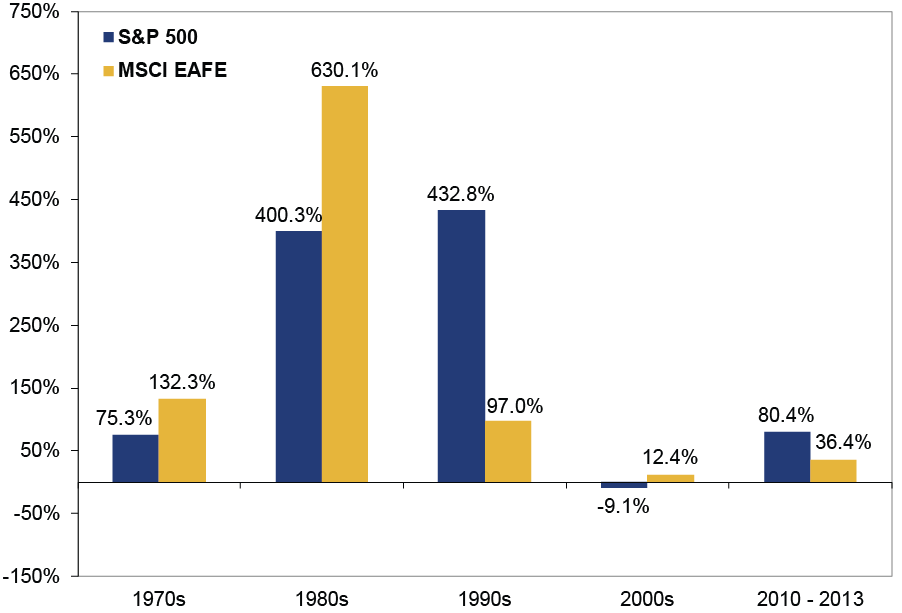Personal Wealth Management / Financial Planning
Hey, Hey, USA Stocks All the Way?
Even though domestic stocks have been leading, long-term investors should diversify globally.
Since 2010, US stocks have overall led foreign, at times by a fairly wide margin. And, as is relatively predictable, a common media theme has popped up-especially, and oddly, among some of the scions of allegedly passive investing-that you should shun foreign stocks and gooooooooooo USA! We love America, too! Apple pie! Football (the ovally kind)! But in our view, the notion American stocks-or any region or country's stocks-are permanently superior falls prey to both recency and home-country bias. US stocks won't outperform forever-as it always has, leadership will rotate. Thus, the added diversification global investing brings can be a significant benefit for investors over the longer term.
Domestic and foreign stocks come into and out of favor-no one category is best for all time. As Exhibit 1 shows, domestic stocks lead in some years, foreign in others. Recency bias[i] drives many folks to forget this. After all, many remember the whopper 1980s bull market but don't realize it was much whoppier(?) for foreign than US stocks. The 1990s were US-dominated, true enough. The truncated 2000s bull? Foreign. Heck, in the latter part of the 2000s bull market, the common claim was you needed foreign to get good returns . (The same allegedly passive investing scion even suggested owning some.[ii]) Some folks theorized foreign was superior after the global financial crisis, based on some weird notions about unemployment. Interestingly, US stocks took the lead shortly after.
Exhibit 1: US vs. Foreign Stock Performance by Calendar Year
Source: FactSet, as of 1/6/2014. Graph shows MSCI USA Index minus MSCI EAFE Index excluding US stocks, 1/1/1970 - 12/31/2013. All returns are inclusive of dividends.
Focusing on only one region-even a big region like the US-can distract you from other areas that outperform roughly half the time, leading to missed opportunity. Consider: What if you fancied foreign over US stocks after the 1980s-and thought them perma-performers? Why waste your time with those sluggish domestic stocks? But if you didn't buy American in the 1990s, you missed huge domestic leadership! (Exhibit 2)
Exhibit 2: Domestic and Foreign Performance Is Cyclical
Source: FactSet and Global Financial Data, Inc., as of 1/7/2014. S&P 500 Total Return Index and MSCI EAFE Index, 12/31/1970 - 12/31/2013. All returns are inclusive of dividends.
Now, you might see all that and say, "Hey, why not just go all in on what you expect to do better! Then go all out of the other!!!" But. What if you're wrong? Having a healthy sense of humility is important-extreme bets avoid the real benefit of diversity, which is that if you're wrong, something has your back. But also, these calls usually pop up after one category outperforms big. Switching focus from one category to the next based on what has performed best recently can be pretty darn costly. That's using past performance as your guide-instead of basing your decision on the future and whether you know something others don't. Said in more derogatory finance industry-speak, it's chasing heat.
Global diversity helps you endure regional leadership changes-the more broadly you diversify, the more you mitigate risks that exist in narrower categories. Just basic finance theory. For instance, diversifying can hedge against bad things afflicting one nation alone: big, bad legislative shifts (boo!), political instability, very specific economic conditions or other major factors confined to one locale. You can't always predict what will happen-no matter how good of an investor you are. And even if you think your predictions are on mark, there is always a chance you will be wrong. Again, humility! Diversify!
Also, the world is becoming more global economically speaking-technology is advancing and countries' economies are becoming more interconnected. The US is clearly still the biggest, most important economy and market, but it's only a quarter of world GDP. Markets, too, are much bigger than just US stocks. The US market's market capitalization is $22 trillion.[iii] Big! But the developed world's market cap is $37 trillion.[iv] Bigger! Investing globally expands your opportunity set-more investing opportunities!
Some argue you can get global by investing in major US "multinationals," but the reality is different. As shown, there are still big, persistent, gameable cycles of category outperformance. The reason is simple: Political drivers and other country-specific factors mean even American firms doing significant business abroad are mostly American. True, you can get exposure to certain trends abroad by buying a US company heavily engaged in them, regardless of domicile. But that doesn't mean it will move totally independent of other US firms. There just isn't a great substitute for venturing beyond your borders.
Diversification is vital for long-term investors' investment success. So how do you know if your portfolio is well-diversified? An article from the CFA Institute summed it up quite nicely: "You know your client's portfolio is properly diversified when there is always a portion of it you hate. Right now, that hateful piece of the equity allocation is global stocks."
Stock Market Outlook
Like what you read? Interested in market analysis for your portfolio? Why not download our in-depth analysis of current investing conditions and our forecast for the period ahead. Our latest report looks at key stock market drivers including market, political, and economic factors. Click Here for More![i] And bad memories!
[ii]This is the antithesis of passive!
[iv] FactSet, as of 12/12/14. MSCI World IMI market capitalization.
If you would like to contact the editors responsible for this article, please message MarketMinder directly.
*The content contained in this article represents only the opinions and viewpoints of the Fisher Investments editorial staff.
Get a weekly roundup of our market insights
Sign up for our weekly e-mail newsletter.

You Imagine Your Future. We Help You Get There.
Are you ready to start your journey to a better financial future?

Where Might the Market Go Next?
Confidently tackle the market’s ups and downs with independent research and analysis that tells you where we think stocks are headed—and why.







